Now here’s something you don’t see every day. Quote:
“Mike Turner is a serious, security-focused lawmaker dedicated at his core to the national security of the United States and to the thoughtful oversight of the Intelligence Community. The removal of Chairman Turner makes our nation less secure and is a terrible portent for what’s to come. The Constitution demands that Congress function as a check and balance to the Executive Branch, not cater to its demands.”
That statement was released Wednesday by Rep. Jim Himes a few hours after Speaker Mike Johnson ousted Turner as chairman of the House Permanent Select Committee on Intelligence. Himes is a Democrat, representing a D+13 district in indigo-blue Connecticut. Turner is a Republican who hails from blood-red Ohio.
It’s remarkable to see a liberal ride to the defense of a conservative in modern Washington but really remarkable to see it happen on the House Intelligence Committee. During Donald Trump’s first term, that panel routinely devolved into bitter squabbling between Republican Rep. Devin Nunes and Democratic Rep. Adam Schiff. It became the most infamously fractious committee in Congress, particularly after it took up the matter of Trump’s attempted quid pro quo with Ukraine.
Fast-forward a few years and the current Democratic ranking member is so heartbroken at seeing the Republican chairman removed that he feels obliged to say so publicly. Trump isn’t even president yet and already he’s bringing the two parties together!
According to Johnson, he fired Turner for, well, no particular reason. There was no problem with his leadership, the speaker assured reporters, claiming he had “nothing but praise” for the now-former chairman and congratulating him for having done a “great job … under very difficult circumstances.” It’s just that the intelligence community has been “controversial” over the last few years and so Johnson thought the committee would benefit from a “reset.”
“It's a new day in Washington,” he said, “a new era.” Boy, is it ever.
If you believe Turner himself, though, Johnson was more explicit about his reasoning when the two met. Supposedly “concerns from Mar-a-Lago” about his chairmanship forced the speaker’s hand, Turner told CBS News. A source confirmed that for the Daily Beast, alleging that “Trump personally got involved and believes that Turner is basically an intel community sycophant.”
The most powerful figure in the executive branch wanted the most powerful figure in the legislative branch to do his bidding and the latter complied. The members of the House Intelligence Committee are “extraordinarily angry” about it, reportedly.
I’m conflicted.
Two motives.
The problem with analyzing Trump’s bullying of other government officials is that two things are simultaneously true.
One: He’s the duly elected president (as of Monday). He and his allies are entitled to try to implement his agenda by using their political leverage to remove obstacles to it.
Two: He’s a corrupt authoritarian nutbag.
When he strongarms someone like Turner, is he acting pursuant to the first motive or the second?
Conceivably it’s the first—and, in a way, who can blame him? Certain people inside the government went to genuinely shocking lengths to thwart Trump during his first term. Gary Cohn, his top economic adviser, allegedly stole papers off his desk (twice!) to prevent him from withdrawing from trade agreements with allies. A U.S. diplomat admitted that his team “routinely misled” senior Trump advisers about the number of American troops in Syria. Shortly before and after the 2020 election, Joint Chiefs Chairman Mark Milley phoned his Chinese counterpart to assure him that the U.S. wasn’t planning an attack and promised to warn him if Trump issued such an order.
The proper course of action for a deputy who disagrees with the president’s policies is to resign, not to undermine them via secret insubordination.
One can view the purging of Mike Turner through that frame. Turner is an old-school hawk, an ardent supporter of aid to Ukraine and a defender of Section 702 surveillance authority entitling U.S. intelligence to harvest the communications of foreign citizens. Key Trump Cabinet nominees are (or were) skeptical of both. If Mike Johnson, Trump’s top ally in Congress, believes a Reaganite like Turner would be an impediment on the intelligence committee to the new administration’s victorious “America First” agenda, why is it wrong for him to remove that impediment?
Earlier this month a Trump-friendly report in Tablet magazine alleged that Turner had been overheard boasting that he was “taking over Trump’s IC [intelligence community].” Supposedly he was referring to one of his top deputies on the House Intelligence Committee being lined up to serve as senior director of intelligence for Trump’s new National Security Committee. Turner, and by extension the “deep state” with which he’s aligned, would soon have hidden influence inside the Trump White House, potentially enabling him to undermine the president’s agenda from within.
If that’s true (big if!), you can understand why Trump and Mike Johnson might want to scale back Turner’s influence over U.S. intelligence.
But here we inevitably circle back to the second motive I described. Did Trumpworld want Turner out of the way because he hoped to sabotage the new president’s isolationist foreign policy or because he hoped to sabotage the new president’s corrupt authoritarian nutbaggery?
Is there even a meaningful difference between the two?
Honor and corruption.
Consider again the example of Milley, a man whom Trump despises so intensely that in 2023 he wondered whether he should be executed for treason.
The grounds ostensibly were those phone calls with the Chinese general but the reality, assuredly, is that Trump hates Milley for the same reasons he hates anyone. Milley told him “no” and made him look bad in the process.
It was Milley, allegedly, who refused Trump’s demands to shoot at protesters during the George Floyd demonstrations in 2020. It was also Milley who appears to have told The Atlantic about the then-president’s “superficial, callous, and, at the deepest human level, repugnant” views of U.S. soldiers: “Why do you bring people like that here? No one wants to see that, the wounded.”
Even the context for Milley’s chats with China is inconvenient for Trump. The president was manifestly out of his gourd by the time of the general’s second phone call, deep in the grip of “rigged election” mania, and Milley worried—justifiably—that he might do something catastrophically rash in his addled state. In phoning his counterpart, he was less Benedict Arnold than Stanislav Petrov.
Mike Turner was poised to play a similar role as head of the House Intelligence Committee in Trump’s coming term. In 2019, when the rest of the party was circling the wagons, he criticized Trump for squeezing Ukraine for dirt on Joe Biden. He showed backbone again on January 6 when he split with most of his Republican colleagues by voting to certify Biden’s victory in the House. And last year he spoke bracingly about Russian propaganda “infecting” elements of his party, which was truer than perhaps he realized at the time.
It’s unthinkable that a Republican House would ever move to impeach Trump, no matter how corruptly he behaved. But I can imagine a Turner-led intel committee asking tough questions about Tulsi Gabbard’s sympathies as director of national intelligence, say, or Kash Patel’s “enemies list” at the FBI. Or even demanding answers the next time Trump’s scummier deputies resolve to engage in a “drug deal” abroad on his behalf.
Ousting Turner as chairman isn’t a simple matter of facilitating Trump’s foreign policy agenda, in other words. It’s a matter of sidelining a rare Republican who’s demonstrated greater loyalty to his ideology than to his party’s leader—“retribution,” one might call it—and who might therefore insist on meaningful oversight of the new administration to force it to keep its nose clean. A presidency that was born unaccountable will naturally abhor having the House’s “deep state” committee led by someone who might demand accountability.
I thought of Turner’s political demise this morning when I read the latest news about Monday’s inauguration.
As it turns out, not only will the top executive at America’s favorite Chinese spy app attend—at the very moment that a ban with bipartisan support is scheduled to take effect—but, according to the Times, he’s “been invited to sit in a position of honor on the dais, where former presidents, family members and other important guests traditionally are seated.”
That’s what “peak Trump” looks like. The soon-to-be president’s strange, selfish, sleazy turnabout on banning TikTok is exactly the sort of alarming security risk that might have plausibly drawn the attention of a serious hawk like Turner. And so, within 24 hours, Turner has been stripped of his “position of honor” atop the House intelligence committee while a mouthpiece for China’s surveillance state has been granted one among American dignitaries during next week’s swearing-in.
No wonder Jim Himes feels a “shiver down my spine.”
Common thread.
Admittedly, trying to understand Turner’s removal by neatly dividing Trump’s motives into “implementing an agenda” and “engaging in rampant corruption” might be too complex. Trump only ever really has one motive, on policy and in life: He wants to be able to do whatever he wants to do whenever he wants to do it and resents anyone who might interfere.
“The hardline talk about the CCP etc is so disconnected from Trump’s transactionalism,” Politico columnist Jonathan Martin said on Thursday. “He invited Xi [Jinping] to his [inauguration], how unsubtle does he have to be? Trump just wants to do big, beautiful deals [with] whoever will do ‘em. Not sure when this will dawn on his party.”
I think it has dawned on his party! Look how many hawkish Republicans who talk tough about China and seem sincere about it have accommodated themselves to Trump’s government-by-whim. By next week, Sen. Marco Rubio will be in charge of his State Department. Sen. Lindsey Graham and Sen. Tom Cotton, two of the most bellicose members in either chamber, have been close allies of the new president for years. Cotton, in fact, recently became chairman of—ta da—the Senate Intelligence Committee, the upper chamber’s counterpart to the panel Turner led in the House. Trump raised no objection to his appointment.
“America First” has plenty of room for earnest hawks provided that they don’t get in Trump’s way. Turner’s problem, I think, is that he wasn’t a trusted MAGA insider the way the others I’ve named are. If Trump wants to do a big, beautiful deal with Xi in which the U.S. agrees to implant TikTok chips in American kids’ brains in exchange for the right to build a Trump Hotel in Beijing or whatever, he knows Graham, Cotton, and certainly Rubio won’t make trouble for him even if they politely disagree. Turner hasn’t proved his loyalty as convincingly, though, which made having him in an influential watchdog position risky. He had to go.
Ultimately one can’t help but laugh at what one Republican lawmaker (anonymously, of course!) told the Daily Beast about the now-former chairman’s ouster. “Trump making demands to fire Turner just fractured the conference,” he complained. “It undermines his whole reconciliation agenda. Dumb move. We are a big tent or we are not. Looks like we are not.”
There is no “tent.” Trump is the tent. The only thing the new, unruly, possibly unstable Republican coalition seems to agree on is that Trump is awesome and career politicians in Washington should stop getting in his way. It’s weird that Mitt Romney understands that while officeholders less militantly opposed to a MAGA restoration persist in delusion.
And so in the end I’m grudgingly fine with Mike Johnson purging Mike Turner. If Trump is the tent then it stands to reason that those whom he distrusts should be expelled from it. If that ends up making American government more corrupt and less competent on balance, so be it. A lousy population deserves lousy representation.
Having said that, though, it sure would be nice if Johnson and figures like Joni Ernst in the Senate dropped any pretense that they’ve behaving “independently” when they capitulate to the new president.
I meant what I said last month. If members of Congress are going to let themselves be intimidated into doing Trump’s bidding against their better judgment, whether by elevating unserious figures like Pete Hegseth or demoting serious ones like Mike Turner, transparency about their cowardice would be a small saving grace. Instead of confirming Hegseth, the Senate could brazenly forfeit its advice-and-consent power by adjourning and letting Trump recess-appoint him instead. Instead of lying about Trump having had nothing to do with Turner’s ouster, Johnson could have told the press frankly, “Sorry, my boss wanted him out.”
The only thing more pitiful than a government in which checks and balances no longer meaningfully exist is that government pretending that it’s still operating according to the constitutional scheme, more or less. If Republicans like Mike Johnson are intent on forfeiting the honor of the positions they hold by engineering their branch’s submission to the executive, they should do so forthrightly. Even in disgrace, there’s a bit of dignity in honesty.
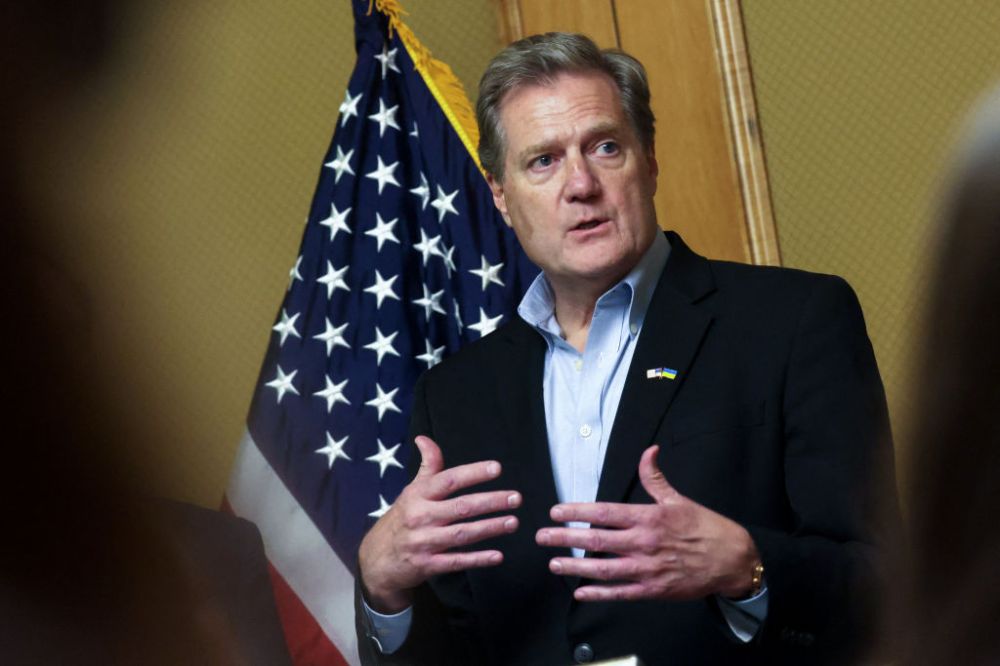

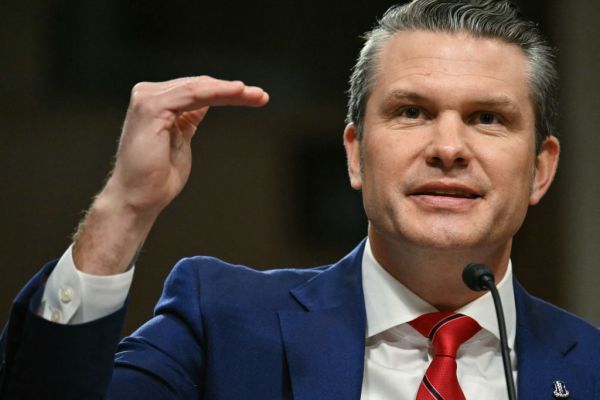
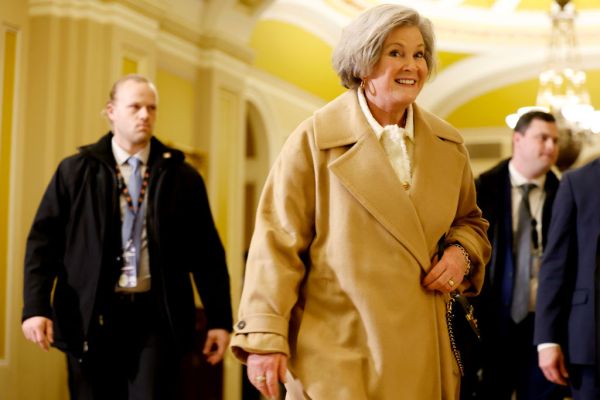
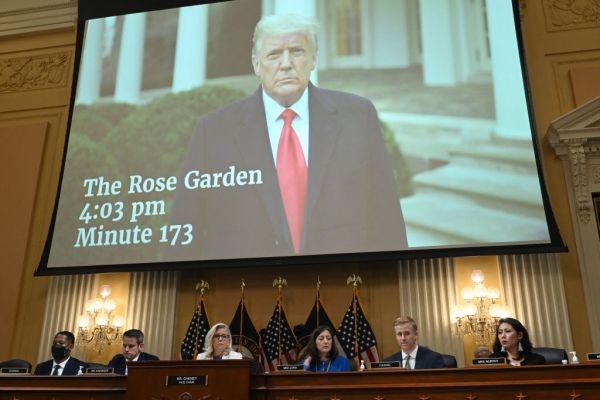

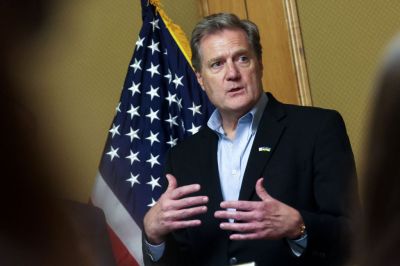
Please note that we at The Dispatch hold ourselves, our work, and our commenters to a higher standard than other places on the internet. We welcome comments that foster genuine debate or discussion—including comments critical of us or our work—but responses that include ad hominem attacks on fellow Dispatch members or are intended to stoke fear and anger may be moderated.
With your membership, you only have the ability to comment on The Morning Dispatch articles. Consider upgrading to join the conversation everywhere.